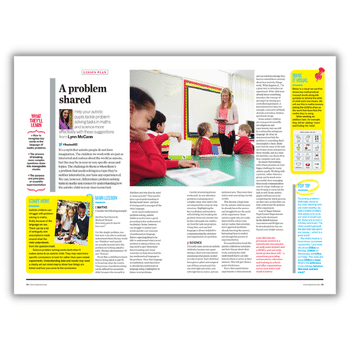Are Your School’s Access Adjustments Reasonable?

Laxmi Patel unpacks what schools need to know with regards to disability discrimination law…
- by Laxmi Patel

The law covering disability discrimination at school falls under the Equality Act 2010 (EA), under which it is unlawful for a school to treat disabled pupils unfavourably.
According to the EA, discrimination can take the form of:
- Direct discrimination – where a school might refuse admission based on a pupil’s disability, for example
- Indirect discrimination – for instance, when a school only provides work in a single format that might not be accessible
- Discrimination arising from a disability – such as cases where a pupil might be prevented from attending a school trip due to their disability.
Discrimination is unlawful in schools in relation to current pupils (even if temporarily absent or excluded), prospective pupils and former pupils. This duty applies to the governing bodies of all schools – be they academies, LA maintained or independent – and covers all areas of school life, from extra-curricular activities and after-school clubs to inter-school sport fixtures and school trips.
What are ‘reasonable adjustments’?
Schools have a duty to make ‘reasonable adjustments’ to ensure that disabled pupils are not discriminated against. This might involve providing extra support, such as specialist teachers or equipment as detailed in a pupil’s Education, Health and Care Plan (or occasionally the Statement of Special Educational Needs that the EHCP is intended to replace)
The pupil’s home local authority has a duty to provide (i.e. fund) the support set out within the ECHP, but the school also has a duty to ensure it has made reasonable adjustments.
This duty to make reasonable adjustments is set out in section 20 of the EA, and entails three requirements:
1. Where a provision, criterion or practice puts a disabled person at a substantial disadvantage, there is a duty to take reasonable steps to avoid the disadvantage
2. Where a physical feature of a property puts a disabled person at a substantial disadvantage, there is a duty to take reasonable steps to avoid the disadvantage
3. Where a disabled person would be at a substantial disadvantage without an auxiliary aid, there is a duty to take reasonable steps to provide the auxiliary aid. The general duty for schools only extends to requirements (1) and (3).
Pre-emptive measures
Schools do, however, also have to comply with schedule 13 of the EA, which states that the responsible body of the school must make reasonable adjustments for disabled pupils, so that they can receive the same level of access enjoyed by other pupils and avoid being put at substantial disadvantage. This duty is anticipatory, which means schools must take pre-emptive measures to overcome any obvious barriers to disability, in addition to any further adjustments they may need to make. Schools must also prepare and further an accessibility strategy.
If an adjustment is reasonable it should be made, and there can be no justification for not doing so. Failing to make a reasonable adjustment is an act of unlawful discrimination. The Act does not define what is considered a ‘reasonable’ adjustment, but does contain guidance that sets out factors schools may take into account.
These include:
- The extent to which special educational provision will be provided to the disabled pupil under Part 3 of the Children and Families Act 2014
- The extent to which an adjustment would overcome the substantial disadvantage suffered by a disabled pupil
- The practicability of the adjustment – an adjustment that is easy and inexpensive to make will likely be found to be more reasonable than one which is difficult or expensive, but the costs should not be passed onto pupils (by increasing the pupil’s school fees, for example)
- The effect of the disability on the pupil
- The resources of the school and availability of financial or other assistance
- Health and safety requirements
- The need to maintain academic, musical, sporting and other standards and the interests of other pupils and potential pupils.
Funding adjustments
Many disabled pupils will receive additional support through the SEN framework, to the extent that the school will have no further obligations under the EA. Schools would be advised to document carefully any decisions taken on reasonable adjustments, so that they can be justified to parents and/or presented at a tribunal hearing for a claim of disability discrimination.
About the author
Laxmi Patel is head of education at Boyes Turner Solicitors; for more information visit senexpertsolicitors.com











